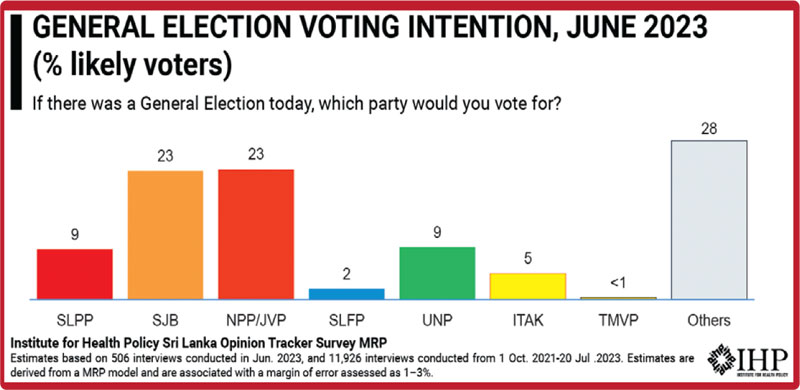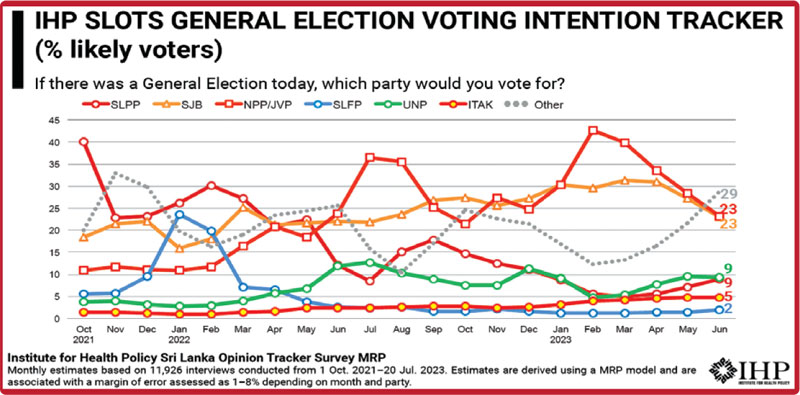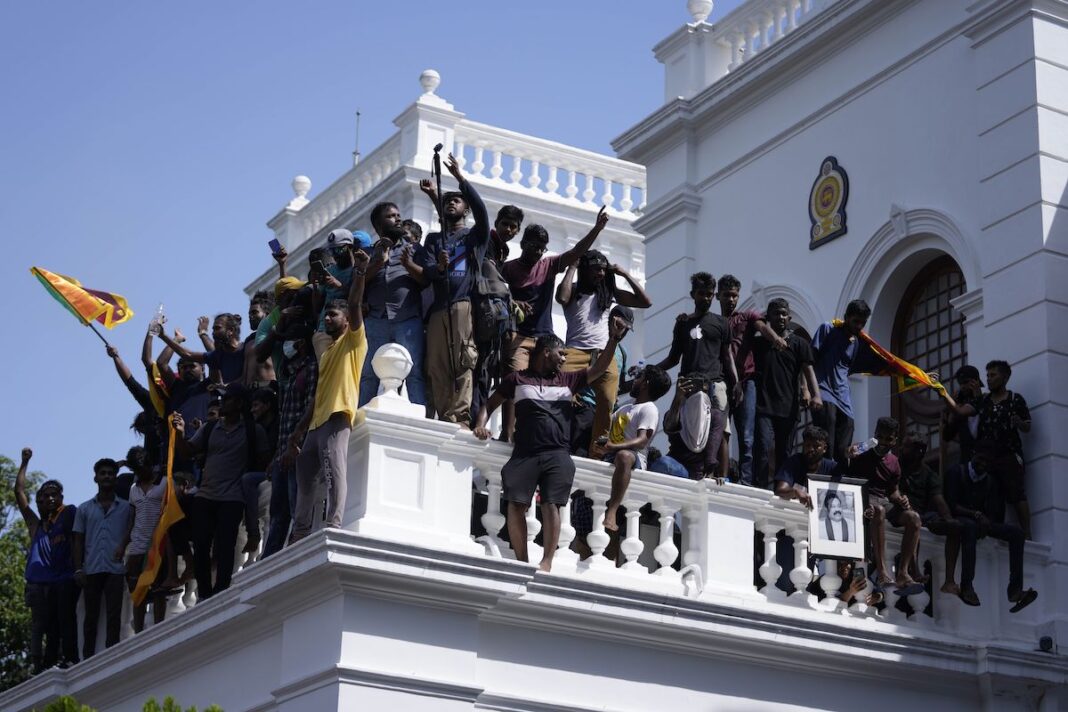Antonio Gramsci listed as a marker of an ‘organic crisis’, the phenomenon of masses detaching themselves from their traditional political parties. Dr. Ravi Ranan-Eliya’s newest IHP polls show an ‘organic’ crisis of the UNP, SLFP and SLPP, and what Gramsci would call a ‘conjunctural’ (situational, episodic) crisis of the SJB and NPP-JVP too.
An organic crisis consumes the two pillars of the two-party system in Sri Lanka, the UNP, which didn’t win a single seat in the present parliament, and the SLFP which held office for over two decades, reduced to a residue. Ranil Wickremesinghe was the common factor. He led the UNP and the SLFP entered into a coalition government with him. The latest opinion polls show that the organic crisis of the UNP and the SLFP continue, while Wickremesinghe’s new patron and partner the ruling SLPP is suffering the same effects of the perils of proximity to him.
The UNP and SLPP cannot get into double digits. They are tied at 9%. The SLFP has flat-lined at 2%. Even if the UNP and SLPP fuse, they would be on 18%.
There is a ‘conjunctural’ deep dip of the NPP-JVP and prolonged stagnation of the SJB, tied at 23%. In the latter case, if unrectified, it can needlessly turn structural.
When one factors in the immediately preceding poll, it shows three political leaders ahead of their respective political parties. Ranil Wickremesinghe is more unpopular than Anura Dissanayake and Sajith Premadasa, and less unpopular than Gotabaya Rajapaksa, but he is also less unpopular than the UNP. Sajith Premadasa is less unpopular than Ranil and Gota and more unpopular than Anura, but he is also more popular than the SJB. Anura Kumara Dissanayake is more popular than Sajith, Ranil and Gota; less popular than he used to be, and also less unpopular, i.e., more popular, than his NPP-JVP. (Major Political Party Leaders More Unpopular Than Ever – Groundviews)
Even if the parties follow the absurd advice of Dr. Harsha de Silva that those with the same economic philosophy should unite, such an SJB-UNP unity would only net 32%, which is far from what is needed to win the presidential election next year, which precedes the parliamentary election of 2025.
The SJB is stuck on 23%, which is exactly what it polled at the parliamentary election of August 2020, and its parent party the undivided UNP scored in February 2018 at the local government election when it was the main party in a coalition government. In contradistinction Sajith Premadasa got 42% at the presidential election of November 2019.
What this means is that it would make more sense to claw-back Sajith’s 42% which he obtained through a populist campaign (Nov 2019), and do whatever it makes to move it to 50%, than go Harsha’s scenic route of unifying all forces of the ‘economic Right’ and wind up with 32%.
The UNP is on 9% despite its leader occupying the presidency. The SLPP is on 9% despite being the ruling party. The SJB is on 23% because it inherited the UNP’s vote base and stayed in that comfort-zone. The UNP is in crisis because it is Ranil’s UNP. The SJB is stagnant at 23% because it remains Ranil’s UNP in Opposition, ideologically and in its policy-profile. That’s the distorting effect of the pro-Ranil ‘economic caucus’.
SJB, NPP can improve
Inasmuch as the SJB retains a UNP policy profile, the voters give it exactly the same rating as the UNP of 2018, i.e., a pathetic 23%. Inasmuch as Sajith Premadasa sounds somewhat different he is less unpopular—more popular—than the SJB. The SJB should sound more like Sajith rather than Sajith or the SJB sound more like the party’s Economic Unit. In its policy profile, the SJB should be more like President Premadasa’s populist-developmentalist UNP (1989-93) and his Citizens’ Front/Puravesi Peramuna (1972-1973) rather than Ranil’s UNP.
Dr. Ranan-Eliya’s IHP tracker shows that currently the biggest block of opinion is neither with the JVP-NPP nor the SJB which are tied at 23% but a larger segment running at 28%-29%, which is undecided, uncommitted to either. This is the decisive though protean populist vote.
Three years since Aug 2020 and the SJB is still stuck in the Feb 2018 UNP groove of 23%. By contrast, the NPP, a dynamic, cross-class, non-party social movement founded and led by Anura Dissanayake, and of which the JVP he leads is the driving force, has helped catapult the JVP from 3% to 23%. Impressive though that is, it isn’t good enough to cross the finish-line. Though the SJB is not moving up, the NPP-JVP is moving down, and they have drawn level with each other. Both parties can and must step up their game:
 The NPP-JVP platform should make much more use of Prof Hiniduma Sunil Senevi, Bimal Ratnayake, Sunil Handunetti, Vijitha Herath and Sunil Watagala.
The NPP-JVP platform should make much more use of Prof Hiniduma Sunil Senevi, Bimal Ratnayake, Sunil Handunetti, Vijitha Herath and Sunil Watagala.
 The SJB should give Sajith a backup-band of progressive populist ‘youngbloods’– Thushara Indunil, Hirunika Premachandra, Mujibur Rahman, Chaminda Wijesiri, Harshana Rajakaruna, Ajith P. Perera, SM Marikkar, Nalin Bandara, et al.
The SJB should give Sajith a backup-band of progressive populist ‘youngbloods’– Thushara Indunil, Hirunika Premachandra, Mujibur Rahman, Chaminda Wijesiri, Harshana Rajakaruna, Ajith P. Perera, SM Marikkar, Nalin Bandara, et al.
 Sajith must use TV and YouTube interviews to persuade voters of his message.
Sajith must use TV and YouTube interviews to persuade voters of his message.
 Both parties must unveil a shadow Cabinet of the best available minds and Present a clear, credible alternative program.
Both parties must unveil a shadow Cabinet of the best available minds and Present a clear, credible alternative program.  The SJB and NPP-JVP as they are, have reached the limit of expansion. Election 2024 can be won by whichever candidate assembles the broadest bloc of sociopolitical forces with the composite profile –pluralist but non-minoritarian– that most appeals to the public imagination, i.e., is socioeconomically majoritarian.
The SJB and NPP-JVP as they are, have reached the limit of expansion. Election 2024 can be won by whichever candidate assembles the broadest bloc of sociopolitical forces with the composite profile –pluralist but non-minoritarian– that most appeals to the public imagination, i.e., is socioeconomically majoritarian.
 Ranil’s intended transfer of Sri Lanka to India and its big bourgeoisie, could conceivably secure the external patronage to target the NPP’s marching electoral army and extra-electorally entrench Wickremesinghe in power as a puppet ruler. A JVP-FSP or NPP-JAV united front, i.e., a Left Bloc, could be the only antidote.
Ranil’s intended transfer of Sri Lanka to India and its big bourgeoisie, could conceivably secure the external patronage to target the NPP’s marching electoral army and extra-electorally entrench Wickremesinghe in power as a puppet ruler. A JVP-FSP or NPP-JAV united front, i.e., a Left Bloc, could be the only antidote.
The NPP-JVP is much better organised for the electoral ground-game than is any other political party.
Meanwhile an elite legal team of Nigel Hatch PC, Saliya Pieris PC and Sunil Watagala fielded by the NPP, broke through argumentatively and persuaded the Supreme Court to give leave to proceed with the case against the attempted murder of the local authorities’ election. The case will prove crucial to the survival of democracy as process and system.
Today, the NPP-JVP seems not only more ‘street’ but also more ‘suit’ than the smugly sedate and sedentary SJB.

SJB-JVP tied, 28% undecided

UNP, SLPP only 9% each
( excerpts from article “Election year 2024 and the crisis of political parties” published in Daily FT on 02.08.23
